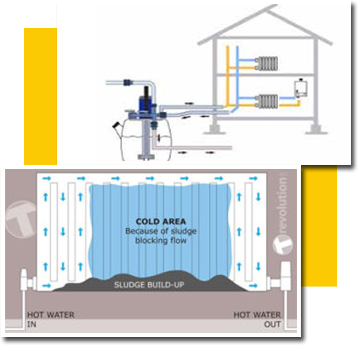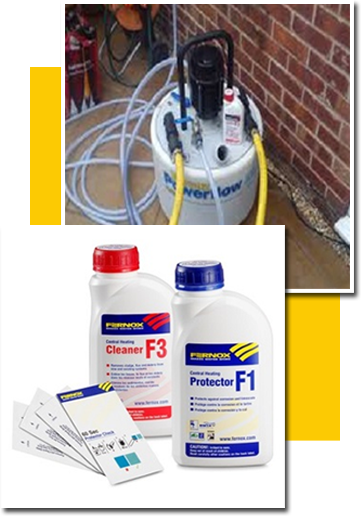The Common Sense approach to heating systems is that they should be power flushed when you fit a new component, such as a heat source (boiler, heat pump) or extension to the circuit and have a magnetic filter fitted to reduce future sludge. If the system is not clean and free of sludge or impurities, you are going to reduce the performance or usable life of the system and the product you are fitting to the system.
Think of it like this. If you are pushing gloopy sludge around your system, you are straining your system and it wont perform well.
Remove the sludge from the boiler, pipework and radiators and your hot water in the heating system will get to your radiators quicker. (therefore it costs you less) and the radiators heat quicker (so the boiler isn’t running for so many extra hours and it costs you less). Your equipment isn’t under constant strain (so breakdowns are less likely and it costs you less)


Your central heating system should be flushed and have new protector fluid every 10 years (even if it has a magnetic filter) to keep it running efficiently
How does Powerflushing work?
We remove a radiator or your circulating pump and attach our machine.
Drain your system
Fill the system again with a sludge removing chemical
This circulates in the system to remove as much sludge as possible from your boiler, pipework and radiators
Then we flush and clean the inside of your boiler, radiators and pipework individually.
Flush it again, then re-fill the system adding a protection fluid to reduce sludge build up
What should I do to get my system powerflushed?
Please fill in the FREE SURVEY form mentioning how many radiators you have,
Whether you have an open vented system, Combi or unvented system and if you are on Gas or Oil.
We will contact you and give you an estimate. If the work is agreed, we will take a deposit and arrange a start date that suits you.
The final balance is payable on completion.
It’s as easy as that.
We look forward to hearing from you.
NOTE: Typical powerflushing time is 1/2 to 1 day (depending on system size and sludge build-up)
Radiators rust from the inside out, so
if removing the sludge creates a leaking rad, that’s down to you.
Things like adding magnetic filters, changing radiators or radiator valves are charged extra to the power flush



